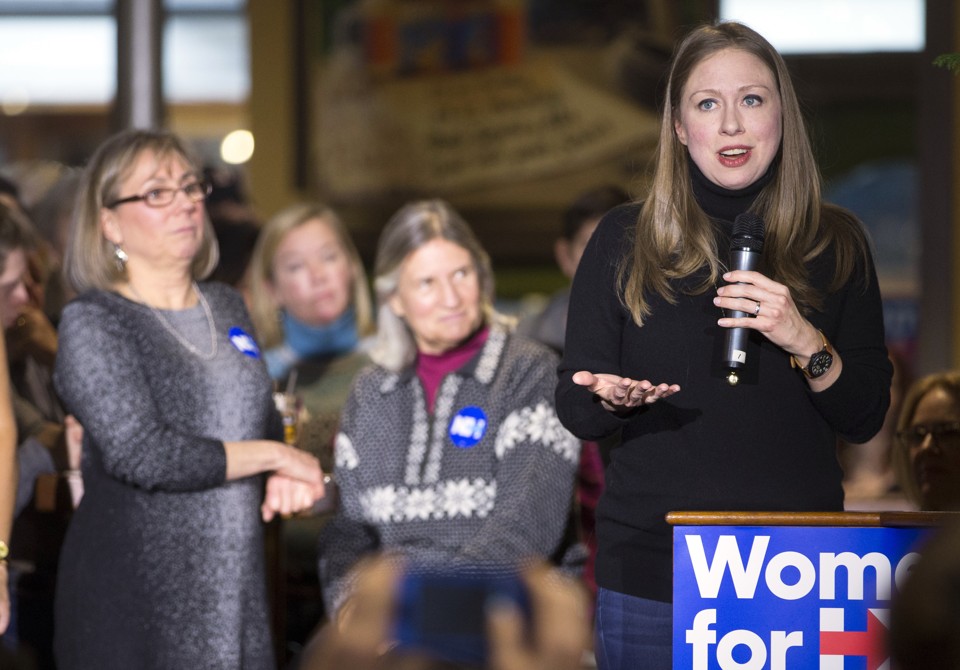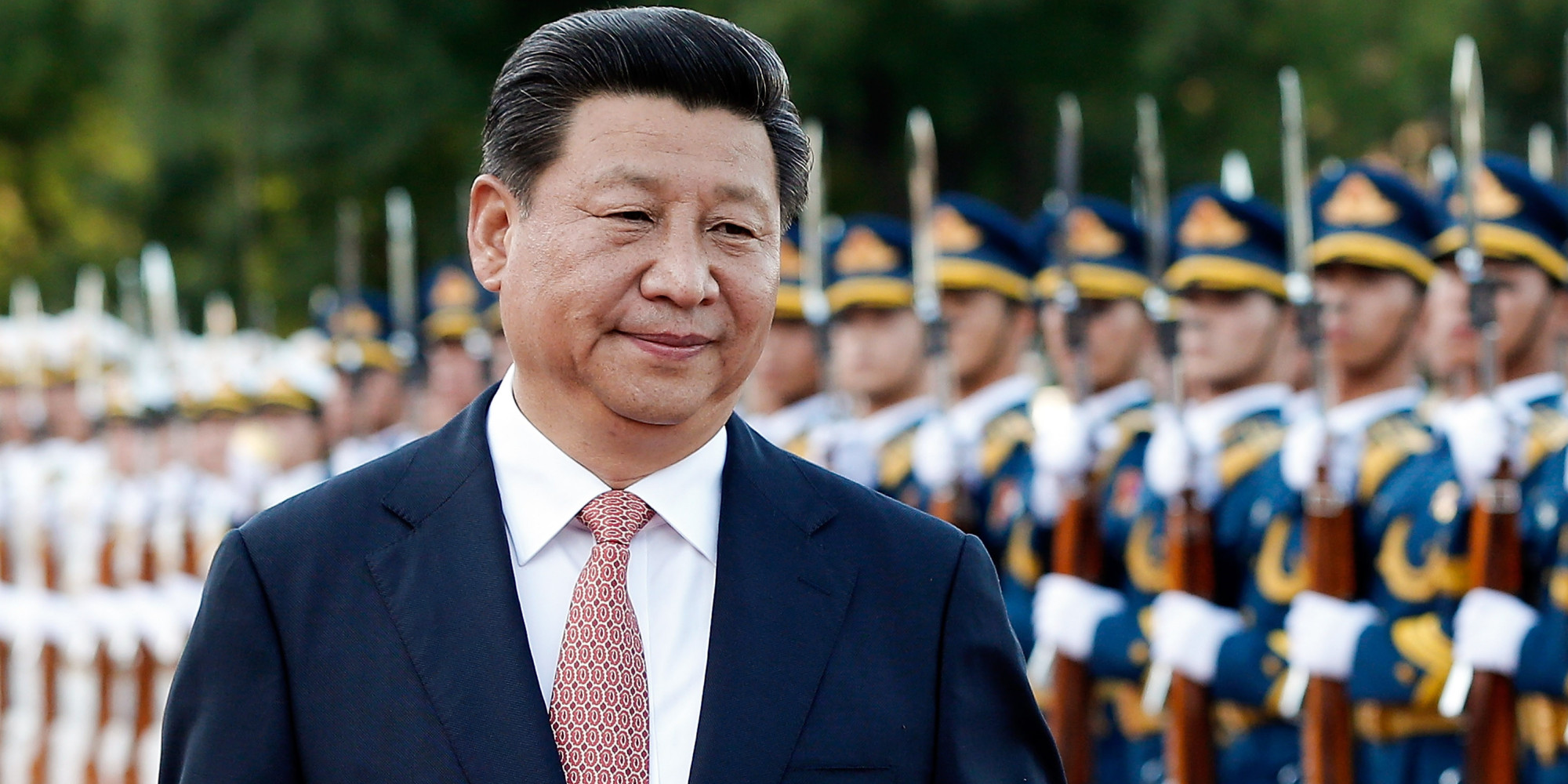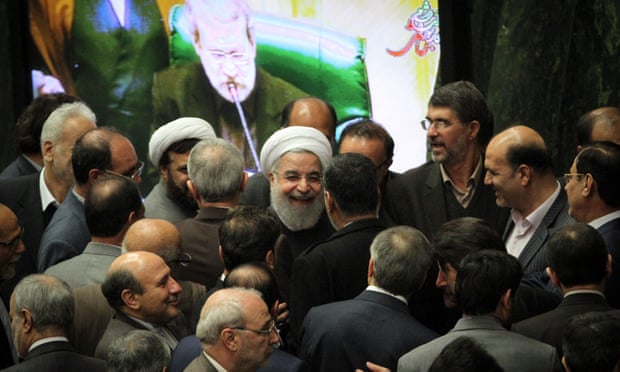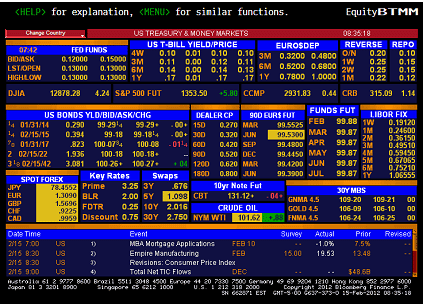
Palin Endorsement Widens Trump’s Lead Among Idiots
“They’re both reality-show hosts,” he said. “And by lowering the bar in 2008, Palin singlehandedly made Trump’s candidacy possible.” ..... “Getting the idiots to support Trump is only half the battle,” the aide said. “Now we have to make sure that they make it to the caucuses without getting lost on the way.”

Hillary Feels The Bern
“Do I consider myself part of the casino-capitalist process, by which so few have so much and so many have so little, by which Wall Street’s greed and recklessness wrecked this economy?” Sanders said. “No, I don’t.” ...... when Sanders declared that America was “sick and tired of hearing about your damn e-mails,” making the uproar over Clinton’s private server sound ridiculous, she beamed. ......
Now the gap has narrowed to eight points.
..... Democratic voters under the age of forty-five prefer Sanders by a margin of about two to one ....... last week Sanders told CBS that he thought Clinton’s campaign was getting “very, very nervous.” ..... “Senator Sanders wants to dismantle Obamacare, dismantle the CHIP program, dismantle Medicare,” Chelsea said. That could “strip millions and millions and millions of people of their health insurance.” Politifact rated the assertion “mostly false.” Sanders has proposed a single-payer system that would automatically cover everyone. He calls it “Medicare for all,” which may be wildly impractical ...... the more extreme the Republicans appear the more plausible Sanders becomes. ..... For all his talk about breaking up the banks, he is less of a radical in the context of his party’s ideology than either Ted Cruz or Donald Trump is in theirs, andhe has a far longer and more traditional political résumé—mayor, congressman, senator—than any other candidate.
In polls of imagined general-election matchups, Sanders and Clinton both beat Trump. ........ We could have a radical from Brooklyn and a real-estate guy from Queens facing off in debates that would sound like nothing so much as an argument on the B41 bus as it barrels down Flatbush Avenue to Kings Plaza. ........According to Merriam-Webster, “socialism” was the most looked-up term in its online dictionary in 2015. (The runner-up was “fascism.”)

The Populist Prophet
Bernie Sanders has spent decades attacking inequality. Now the country is listening.
Young people who like Bernie Sanders like him because he sounds like an old record. He’s been talking about the injustices done to working people by unequal income distribution for more than forty years. His voice, often hoarse from his habitually loud and impassioned speeches, even has the crackle of worn vinyl. ....... All the friends described Sanders as “authentic,” a word that many people would be hesitant to apply to Hillary Clinton. ...... Howard Dean was thrown off the national stage for being angry. But people like Trump because he’s an asshole and says whatever he wants.” Kiley’s friend Dawn York, who runs a vintage-clothing shop, said,
“Most candidates are robotic and rehearsed.” She saw “a real person in Bernie.”
........ among voters under the age of thirty, forty-nine per cent had a positive view of socialism. (Only forty-six per cent had a positive view of capitalism.) .......younger voters “may not be willing to entertain a whole new system, but they are open to a pretty profound critique of the current one.
....... “many American institutions—Social Security, unions, Medicare, the postal service—have elements of socialism.” .......“America today is the wealthiest country in the history of the world,” he declared. “But most people don’t know that, most people don’t feel that, most people don’t see that—because almost all of the wealth rests in the hands of a tiny few.”
......... He would like to break up the big banks, create jobs by rebuilding infrastructure, and move toward public funding of elections—and provide free tuition at public universities. ...... He wants to end the “international embarrassment of being the only major country on Earth which does not guarantee workers paid medical and family leave.” ....... Gutman told me, “I read a third of Piketty’s book. I don’t think Bernie would read a page of it.” ............ he was ardent in his admiration for Pope Francis, who has condemned the “economy of exclusion.” ....... He also understands the necessity of the selfie dance, maneuvering quickly into place and smiling briefly. Sanders does not excel, however, at the middle ground of casual, friendly conversation. He has no gift for anecdote. When talking to voters, Hillary Clinton has perfected the head-cocked semblance of keen interest; it’s clear when Sanders becomes bored.Nelson told me, “Bernie’s the last person you’d want to be stuck on a desert island with. Two weeks of lectures about health care, and you’d look for a shark and dive in.”
Nelson has voted for him many times. ......... Message delivered—he didn’t want to meet anyone or eat anything or answer any questions. He was out of there.” .......Tumblr is full of memes that play up the contrast between Sanders’s age and his popularity with hipsters.
....... “The sort of detached, post-Jon Stewart generation—they’re the ones putting inverted commas around what Bernie stands for. ‘Look at this grumpy old Jewish socialist from Brooklyn!’ It’s not cynical, though—they really believe in what he’s saying.” .......... she said that she had been thinking about “how refreshing it was to have someone point out to us that, as hardworking Americans, some things aren’t a privilege, they are a right. . . . I’m self-employed, I started my own business three and a half years ago, and my husband works full-time for Whole Foods—and we barely get by. We own a home, we both graduated from college, and we work more than forty hours a week, and we can barely put oil in our heating tanks in the winter. We have no savings and no way to financially handle any hiccups that may come our way. And I had to be reminded that it shouldn’t be that way.” ....... In June, when NPR’s David Greene pressed Sanders on whether he embraced the phrase “Black Lives Matter,” the Senator got irritated. “It’s too easy for quote-unquote liberals to be saying, ‘Well, let’s use this phrase,’ ” he said. “We need a massive jobs program to put black kids to work and white kids to work and Hispanic kids to work. So my point is, is that it’s sometimes easy to worry about which phrase you’re going to use. It’s a lot harder to stand up to the billionaire class.” .......... even made a joke: “I was the best and worst congressman Vermont had.” (Vermont has only one.) ........ a racial-justice platform that recommended police reform, federal funding for police body cameras, a ban on for-profit prisons, and the elimination of mandatory-minimum jail sentences. ....... proposes making Election Day a federal holiday ........ “When I talk about a political revolution, what I’m talking about is how we create millions of decent-paying jobs, how we reduce youth unemployment ........ growing up Jewish—less for the religious content than for the sense it imbued in him that politics mattered. ........ He went to public schools, including James Madison High School, an incubator of civic talent, from which Ruth Bader Ginsburg and Senator Chuck Schumer also graduated. He didn’t make the school’s championship basketball team—a deep disappointment—but he ran cross-country, and feels that this activity accounts for some of his formidable stamina today. ............... “I do know what it’s like when the electric company shuts off the electricity and the phone company shuts off the phone—all that stuff. So, for me, to talk to working-class people is not very hard.” .......he took away a lesson: “An election in 1932 ended up killing fifty million people around the world.”
........ “if you talk about his Jewish identity, it’s strong. It’s certainly more ethnic and cultural than religious—except for his devotion to the ethical part of public life in Judaism, the moral part. ........ his friend would often greet him in the morning by saying, “We’re not crazy, you know,” referring to the anger they felt about social injustices. Sugarman would respond, “Could you say good morning first?” ...... Sanders attended Brooklyn College for a year, then transferred to the University of Chicago ....... Sanders was a “leader of the civil-rights movement on campus.” Sanders, who received a political-science degree in 1964, has said that he was a mediocre student because he found the classroom boring and irrelevant—and that he learned “infinitely more on the streets and in the community.” ......... had a carpentry business with a few other guys in New York. It was called Creative Carpentry, and Rader says that it was accurately named: “They advertised in the Village Voice, but didn’t know much about carpentry. They’d go to the hardware store to buy supplies, and ask the clerk how to do the repairs they’d been hired to do.” ........ Sanders wore his social conscience on his sleeve, but few people who knew him in the sixties and seventies would have predicted that he would become a leading candidate for the Democratic Presidential nomination. ....... People who knew Sanders when he was in his thirties tend to share stories about how broke and frugal he was. Rader told me that when Sanders first bought land in Vermont, and was still living part time in New York, he sometimes camped out in the new property’s only shelter: a maple-sugar shack. He had devised his own equivalent of Sterno, which his friends dubbed Berno. “It was a roll of toilet paper soaked in lighter fluid inside a coffee can,” Rader said. “He’d cook over that.” .......... he lost by an enormous margin. During the next ten years, he ran twice for senator and twice for governor, and never got more than six per cent of the vote. ...... “The difference between Bernie and most of the lefties is Bernie wants to win,” Garrison Nelson said.“Most lefties don’t want to win, because if you win you sell out your purity.”
.......... Sanders was a thirty-nine-year-old man who didn’t own a suit. As Paula Routly told me, “Monied interests were shaking in their boots at first.” ....... True, he travelled to Nicaragua, where he met with Daniel Ortega and found a sister city for Burlington. (Vermont reporters dubbed the mayor and his coalition the Sandernistas.) But he also presided over economic development that transformed the city into a hipper, more forward-looking place—one of those small cities that appear on lists of the most livable. ......... “He got a lot done, but not through the art of gentle persuasion. Bernie’s style was top-down and confrontational.” Still, he was reëlected three times. ......... “I feel more, every day, that he can win. ........ a Quinnipiac University poll showing that, in a general-election contest against Donald Trump, Sanders would win by eight percentage points. .......Vermont is a gun-friendly state: twenty-eight per cent of its residents own firearms, according to a recent survey, and it has some of the nation’s most permissive gun laws.
......... Sanders tends to present guns as an urban problem that Vermonters can afford not to worry about, though mass shootings can happen anywhere and suicides by gun are as much a problem in Vermont as they are in other states. ......... “I’m proud of my state, and I think I’m in a good position to try to bridge the gap between urban America—where guns mean one thing, where guns mean guns in the hands of kids who are shooting each other or shooting at police officers—and rural America, where significant majorities of people are gun owners, and ninety-nine per cent of them are lawful.” ......... “Bernie shows up in Washington in 1991, there’s still a chunk of Southerners in the Democratic caucus, and they do not want Bernie in the caucus.” Sanders didn’t help matters by giving more than one interview denouncing Congress. “This place is not working,” he told the Associated Press. “It is failing. Change is not going to take place until many hundreds of these people are thrown out of their offices.” He went on, “Congress does not have the courage to stand up to the powerful interests. I have the freedom to speak my mind.” ........... He was one of the founding members and the first chair of the Congressional Progressive Caucus, which has grown steadily over the years, from six members in 1991 to seventy-one today. ......... He was reëlected to the House seven times. And his ascent to the Senate, in 2006, was stunning: he trounced the Republican candidate, Richard Tarrant, one of the wealthiest men in the state, by thirty-three percentage points. ......... People here like him making a lot of noise in Washington for a little state—they’re happy to send a human hand grenade down there.” But they don’t necessarily want Sanders running the state .......... “Negotiating with Bernie was not a usual experience, because he is very passionate and he and I are both very strong-willed people, and we spend a lot of time banging our fists on the table and having the occasional four-letter word. But at the end of the day Bernie was result-oriented.” ........... He successfully made an amendment to the Affordable Care Act which allotted eleven billion dollars for community-health centers to provide primary care regardless of patients’ ability to pay. .........in the most recent fund-raising cycle donations to his campaign were neck and neck with Clinton’s
........ in a recent YouGov/CBS News poll Sanders is leading Clinton by twenty-two percentage points in New Hampshire and ten in Iowa. But the picture in South Carolina is quite different: there Clinton is twenty-three points ahead. ....... “There is a reason why Wall Street and all of corporate America likes immigration reform,” he said at an event held by the United States Hispanic Chamber of Commerce in July. “It is not, in my view, that they are staying up nights worrying about undocumented workers in this country. What I think they are interested in is seeing a process by which we can bring low-wage labor of all levels into this country, to depress wages in America.” ........ Clinton, “She’s not worried about Bernie. But she is worried about the Bernie effect—which is to demonstrate her relative weaknesses as a candidate. He hits at her Achilles’ heel, which is authenticity.” ........sixty-six per cent of Americans feel that “money and wealth in this country should be more evenly distributed”; seventy-one per cent favor raising the minimum wage, at least slightly; and seventy-four per cent believe that corporations exert too much influence on American politics and life.
......... nearly half of Americans are “strong redistributionists, in the sense that they believe the distribution of wealth and income is not fair, and endorse heavy taxes on the rich as a way of redistributing wealth.” ........ The American electorate seems to respond simultaneously to calls for redistributive justice and the rejection of the entity most likely to accomplish it: the federal government. And many voters might feel that matters of economic fairness are trumped by such social issues as abortion and guns. ......... Unlike many liberal élites, Sanders does not seem to prefer talking to people who share his views; because he is not an especially convivial person, he does not require conviviality from others. Sanders relishes the opportunity to enter enemy territory, where he believes that he can find secret allies. .......... He did not make knowing jokes about these differences: as usual, Sanders was dead serious. The students were poker-faced but polite. ....... Unlike his slicker rivals, Sanders is most at ease talking about the moral and ethical dimensions of politics. “We are living in a nation and in a world—the Bible speaks to this issue—in a nation and in a world which worships not love of brothers and sisters, not love of the poor and the sick, but worships the acquisition of money and great wealth.” ........ Staring at the crowd, he quoted the Hebrew Bible, his fist punctuating nearly every word: “Let justice roll on like a river, righteousness like a never-failing stream.”

The Inevitability Trap
Hillary Clinton and the drawbacks of being the front-runner.
“It’s really hard for me to express how grateful I am, on behalf of my husband and myself, to the people of New Hampshire,” Clinton said. “Starting way back in 1991, you opened your homes and your hearts to us. And in 2008, during the darkest days of my campaign, you lifted me up, you gave me my voice back, you taught me so much about grit and determination, and I will never forget that.” ........ In national surveys this year, Clinton’s support among Democrats has been as high as seventy-three per cent. That makes her the most dominant front-runner at this stage of a Presidential contest in the Party’s modern history. .....
The press, invested in political drama, declares that the front-runner is vulnerable.
....... In 1984, Walter Mondale, Jimmy Carter’s Vice-President, loomed over the Democratic field much as Clinton does now. ........ Although Dean built a large following, he couldn’t organize it. ....... “In some ways I got captivated by my own campaign,” Dean told me. He found it impossible to make the ideological and stylistic shifts that might have transformed him from insurgent into front-runner. “The problem with running against somebody like Hillary—or my problem running against Kerry—is that, when you make the turn, then you disappoint all your followers.” ......... But Obama had a sophisticated plan to get them to the polls. These three ingredients—message, demographics, and organization—were just enough to defeat Clinton in the primaries. For the first time in modern history, a Democratic insurgency defeated the establishment. ........ Historically, the longer a party remains in power, the more emboldened its activist base becomes. Many liberals are frustrated with Obama’s inability to enact more progressive change, such as assertive policies against global warming and income inequality, comprehensive immigration reform, or a less hawkish foreign policy. Democratic-primary voters are always eager to see a fresh potential candidate. ........ Clinton can’t present herself as a novelty. She’ll be sixty-nine on Election Day in 2016 and has been a national figure for a quarter century. The last politician to become President after a similarly long and distinguished career was George H. W. Bush. Since then, the office has been won by relative newcomers: Bill Clinton, George W. Bush, and Obama. “The one time in my political life that we’ve gone back a generation was Carter to Reagan,” Dean said. “Once you change the page on generations, you don’t go back.” He added that Clinton could be the exception. ......... The Hart campaign’s organizational failure was an education for O’Malley. “It was like a ‘Lion, the Witch and the Wardrobe’ experience for me,” O’Malley said. “I walked into the wardrobe, I got about twenty years of adult experience in management and being under deadlines and high pressure, and then I came back and I was still twenty-one.” ........ He applied his data-driven techniques to crime, and Baltimore’s murder rate plummeted to below three hundred per year for the first time in a decade. ......... O’Malley told me that Obama’s response to the 2008 financial crisis was too timid: “When the Recovery and Reinvestment Act was introduced, it was probably half of what it needed to be, and the congressional parts of our own party watered it down to a half of that, which meantit was about a quarter of what it needed to be
.” And Obama was too soft on Wall Street, O’Malley said. “The moment was ripe for much more aggressive action.If an institution is too big to fail, too big to jail, too big to prosecute, then it’s probably too damn big.”
........... Michael Podhorzer, the political director at the A.F.L.-C.I.O., said, “What we learned from the Obama Administration is that if the Presidential candidate surrounds themself with the usual Wall Street suspects, then, whatever the populist rhetoric is, that’s not going to be good enough.” ......... O’Malley had a tightly scheduled day of events ahead and he ordered the No. 5:scrambled eggs, bacon, hash browns, toast, pancakes, and coffee.
....... The Clintons and Obama have championed policies that help the poor by strengthening the safety net, but they have shown relatively little interest in structural changes that would reverse runaway income inequality. “There is a big tendency among a lot of Democratic leaders to feed some raw meat to the public on smaller issues that excite them, like the minimum wage, but don’t really address the larger problem,” Webb said. ...........the prison population in the U.S. exploded after the Clinton Administration signed tough new sentencing laws.
........ “This incredible strategic blunder of invading caused the problems, because it allowed the breakup of Iraq along sectarian lines at the same time that Iran was empowering itself in the region.” ........ Webb also disdains liberals who advocate military intervention without understanding the American military. Referring to Syria and Libya, Webb said, “I was saying in hearings at the time, What is going to replace it?What is going to replace the Assad regime?
These are tribal countries. Where are all these weapons systems that Qaddafi had? Probably in Syria. Can you get to the airport at Tripoli today? Probably not. It was an enormous destabilizing impact with the Arab Spring.” ..........ong wisps of Sanders’s white hair levitated above his head, as if he were conducting electricity.
....... “We look at the United Kingdom and their queens, their dukes, and whatever else they have, and say, ‘Well, that is a class society, that’s not America.’ Well, guess what? We have more income and wealth inequality in this country than the U.K. and any other major country on earth.” It was time “for a political revolution.” ........ “The Clinton Administration worked arm in arm with Alan Greenspan—who is, on economic matters, obviously, an extreme right-wing libertarian—on deregulating Wall Street, and that was a total disaster,” Sanders said. “And then you had the welfare issue, trade policies. You had the Defense of Marriage Act.” ....... He said that the George W. Bush Presidency “will go down in history as certainly the worst Administration in the modern history of America.” But he has also been disappointed by Obama. “I have been the most vocal opponent of him in the Democratic Caucus,” he told me. In his view, Obama should have kept the grass roots of his 2008 campaign involved after he was elected, and he should have gone aggressively after Wall Street. “His weakness is that either he is too much tied to the big-money interests, or too quote-unquote nice a guy to be taking on the ruling class.” .......... “I didn’t know that they could track back everything you had ever said,” Sanders told me. “That did not use to be the case. You could certainly get away with a lot of stuff—not anymore!” ........“If I was a billionaire, if I was a Ross Perot type, absolutely, I’d run as an independent. Because there is now profound anger at both political parties. But it takes a huge amount of money and organizational time to even get on the ballot in fifty states.”
......... “I think it’s a very deep dissatisfaction with the political establishment.” He insisted that he would run a serious campaign against her, not just “an educational campaign” about his pet issues. “If I run, I certainly would run to win.” ....... the first fought by Democrats since the Supreme Court opened the door for individuals to spend unlimited sums of money on an election.




















